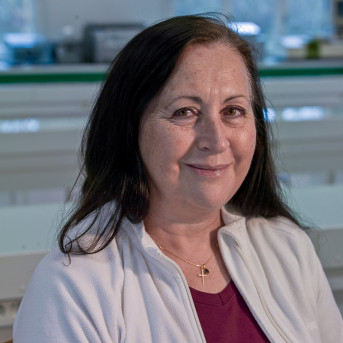Fascinated by the regenerative capacity of plant cells, I focused on deciphering the molecular mechanisms that control adventitious root regeneration, required for the vegetative propagation. I am also interested in the vascular development and the mechanisms of carbon allocation.
Academic and professional career
Catherine Bellini is an agricultural engineer from the ENSAIA in Nancy (1985) and holds a Masters degree in Microbiology from the University of Paris XI - Orsay (1986). In June 1989 she obtained a PhD in Plant Molecular and Cellular Biology from the University of Paris XI - Orsay, and was recruited as a researcher at the Cell Biology Laboratory (LBC) of INRA in Versailles. She obtained a Marie Curie scholarship for young researchers and left for a two-year post-doc at the University of Pavia (Italy; 1989-1991). Since 1999 she has been a senior research scientist at INRA, and deputy director of the LBC from 1998 to 2002. In 2002 she obtained a second Marie Curie Fellowship, this time for established researchers, in the framework of a public-private partnership with the start-up SweTree Technology, and joined the Umeå Plant Science Center (Umeå, Sweden) where she initiated and promoted the cooperation between INRA and UPSC by creating a European Open Laboratory (UPRA). In 2009 she was recruited as a full professor at the Department of Plant Physiology at Umeå University and returned to the IJPB (INRA, Versailles) where she joined the CATS team led by Sylvie Dinant, on a part-time basis. Since then, she has been seconded to the University of Umeå and shares her time between the IJPB (France) and the UPSC (Sweden)
Scientific interests
My research focuses on two different aspects of plant development and physiology, using the model system Arabidopsis thaliana, and more recently hybrid aspen and Norway spruce.
One of the projects, which started at UPSC but has been continued since 2011 in the CATS (Carbon Allocation Transport and Signaling) group led by Sylvie Dinant at IJPB, focuses more specifically on sugar transport and carbon allocation, and their role on plant development and interaction with the environment.
The second project, developed at the UPSC (Sweden), is devoted to the study of the molecular mechanisms that control the initiation of adventitious roots, a limiting step in the vegetative propagation of economically important species, link.
Catherine Bellini is an agricultural engineer from the ENSAIA in Nancy (1985) and holds a Masters degree in Microbiology from the University of Paris XI - Orsay (1986). In June 1989 she obtained a PhD in Plant Molecular and Cellular Biology from the University of Paris XI - Orsay, and was recruited as a researcher at the Cell Biology Laboratory (LBC) of INRA in Versailles. She obtained a Marie Curie scholarship for young researchers and left for a two-year post-doc at the University of Pavia (Italy; 1989-1991). Since 1999 she has been a senior research scientist at INRA, and deputy director of the LBC from 1998 to 2002. In 2002 she obtained a second Marie Curie Fellowship, this time for established researchers, in the framework of a public-private partnership with the start-up SweTree Technology, and joined the Umeå Plant Science Center (Umeå, Sweden) where she initiated and promoted the cooperation between INRA and UPSC by creating a European Open Laboratory (UPRA). In 2009 she was recruited as a full professor at the Department of Plant Physiology at Umeå University and returned to the IJPB (INRA, Versailles) where she joined the CATS team led by Sylvie Dinant, on a part-time basis. Since then, she has been seconded to the University of Umeå and shares her time between the IJPB (France) and the UPSC (Sweden)
Scientific interests
My research focuses on two different aspects of plant development and physiology, using the model system Arabidopsis thaliana, and more recently hybrid aspen and Norway spruce.
One of the projects, which started at UPSC but has been continued since 2011 in the CATS (Carbon Allocation Transport and Signaling) group led by Sylvie Dinant at IJPB, focuses more specifically on sugar transport and carbon allocation, and their role on plant development and interaction with the environment.
The second project, developed at the UPSC (Sweden), is devoted to the study of the molecular mechanisms that control the initiation of adventitious roots, a limiting step in the vegetative propagation of economically important species, link.
